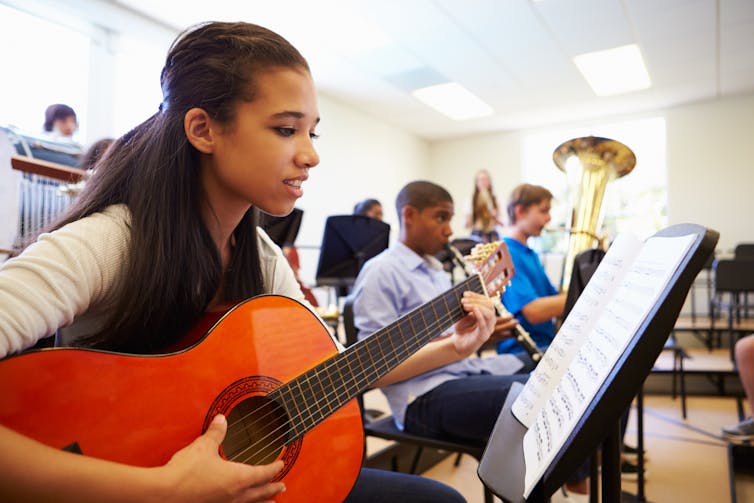
Few would disagree that a good education means more than just exam results. The benefits of non-academic experiences – from sports competitions, charity events, or school plays – have been shown to lead to more than just happy memories.
Evidence shows that taking part in extracurricular activities can support academic attainment, even into adulthood, as well as bringing personal benefits such as social skills, improved well-being, and self-confidence.
Research in the US also found that attending extracurricular activities improves relationships with peers, parents, and teachers. Such experiences can also help to develop a host of skills which may interest employers and help university application forms bristle with interesting extras. But the amount of extracurricular activity available to post-16 students will depend on their course of study.
A-levels vs IB Diploma
A-level students tend to focus on three or four academic subjects studied in depth. Extracurricular activities are arranged at the discretion of individual school or colleges. The International Baccalaureate, on the other hand, takes a different approach. In the IB Diploma programme (IBDP) for 16 to 19-year-olds, six academic subjects are complemented by a core which includes a compulsory experience-based element. This is known as Creativity, Activity, Service (CAS).
Students are encouraged to examine global issues from local perspectives while undertaking enjoyable and significant experiences in each of the three CAS strands. They then combine two or more strands in a CAS project. Music, arts, or theatre, for example, can count towards fulfilling Creativity, while sports and exercise meet Activity requirements.
For Service, students engage in volunteering at school or for charities. As well as their studies, students may end up writing for the school newspaper, doing Zumba, and raising money for socially just causes. The important point is not what students do for their CAS activities, but that CAS is compulsory. This reflects the IB’s commitment to provide a holistic education that goes beyond learning “stuff”.

Extracurricular activities can make a big difference to children’s lives. Source: Shutterstock
As part of a study undertaken by researchers from the Department of Education at the University of Bath, more than 8,000 students attending schools in 89 countries were surveyed about CAS while they were completing the IBDP. Of those students, 81 percent agreed that CAS helped to prepare them for their future and 73 percent said that it helped prepare them for university.
The study also surveyed 490 teachers responsible for implementing CAS who perceived the experiences to be helpful in developing the initiative, adaptability, and leadership skills of students. The students also identified that the fun they had along the way was a “stress buster”, helping to balance the demands of high pressure academic work.
What about A-levels?
How does this compare to the A-level route? Well, that may depend on a number of things, including the importance individual schools and colleges place on non-academic experiences, as well as the resources they have to facilitate them. If these actives are not free or subsidised, the ability of parents to fund these activities will also be a factor – and private school students may be the winners.
Gordonstoun, for example, is an elite independent school in Scotland which offers A-levels augmented by a vibrant out-of-classroom programme. According to recent research by Simon Beames, 94 percent of alumni from Gordonstoun believed that out-of-classroom experiences, such as sea journeys on a Sail Training programme, had a positive influence on their personal growth and helped them develop a “give it a go” attitude.
Outside the independent school sector, wealthier parents may well be able to pay for expensive trips abroad or summer camps for their late teen children. But children from families who do not have the money to pay for such activities can lose out on the benefits.
Striking a balance
Providing good quality extracurricular activities costs money and this poses difficulties when finances – of schools or families – are stretched. Recent findings from the Institute for Fiscal Studies show that, although 75 percent of young people aged 16 to 19 in England are in full or part-time education, the funding for this sector has dropped by 14 percent. Meanwhile over a quarter of local authority schools in England are in deficit and struggling to pay for staff.
At a time of growing inequity in educational opportunities – when schools divert funding away from “optional” extracurricular activities – parents who can afford to, can choose to opt-in to private provision. However, this option is not available to all parents, and the effect may perpetuate social inequalities further.
Our research confirms the extent to which nonacademic activities help develop balanced and well-rounded young people. While education is skewed towards academic content – leading to concerns about the effects of continual examination on children’s mental health – perhaps it is time for extracurricular activities to be part of all post-16 curricula and made accessible to every student.
By Shona McIntosh, Lecturer in Education, University of Bath
This article was originally published on The Conversation. Read the original article.
Liked this? Then you’ll love…
![]()







